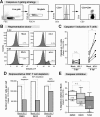Microbial exposure alters HIV-1-induced mucosal CD4+ T cell death pathways Ex vivo
- PMID: 24495380
- PMCID: PMC3922902
- DOI: 10.1186/1742-4690-11-14
Microbial exposure alters HIV-1-induced mucosal CD4+ T cell death pathways Ex vivo
Abstract
Background: Early HIV-1 infection causes massive CD4+ T cell death in the gut and translocation of bacteria into the circulation. However, the programmed cell death (PCD) pathways used by HIV-1 to kill CD4+ T cells in the gut, and the impact of microbial exposure on T cell loss, remain unclear. Understanding mucosal HIV-1 triggered PCD could be advanced by an ex vivo system involving lamina propria mononuclear cells (LPMCs). We therefore modeled the interactions of gut LPMCs, CCR5-tropic HIV-1 and a commensal gut bacterial species, Escherichia coli. In this Lamina Propria Aggregate Culture (LPAC) model, LPMCs were infected with HIV-1BaL by spinoculation and cultured in the presence or absence of heat killed E.coli. CD4+ T cell numbers derived from flow cytometry and viable cell counts were reported relative to mock infection. Viable cells were identified by viability dye exclusion (AqVi), and intracellular HIV-1 Gag p24 protein was used to identify infected cells. Annexin V and AqVi were used to identify apoptotic versus necrotic cells. Caspase-1 and Caspase-3 activities were blocked using specific inhibitors YVAD and DEVD, respectively.
Results: CD4+ T cell depletion following HIV-1 infection was reproducibly observed by 6 days post infection (dpi). Depletion at 6 dpi strongly correlated with infection frequency at 4 dpi, was significantly blocked by Efavirenz treatment, and was primarily driven by p24-negative cells that were predominantly necrotic. HIV-1 infection significantly induced CD4+ T-cell intrinsic Caspase-1 activity, whereas Caspase-1 inhibition, but not Caspase-3 inhibition, significantly blocked CD4+ T cell depletion. Exposure to E.coli enhanced HIV-1 infection and CD4+ T depletion, and significantly increased the number of apoptotic p24+ cells. Notably, CD4+ T cell depletion in the presence of E.coli was partially blocked by Caspase-3, but not by Caspase-1 inhibition.
Conclusions: In the LPAC model, HIV-1 induced Caspase-1 mediated pyroptosis in bystander CD4+ T cells, but microbial exposure shifted the PCD mechanism toward apoptosis of productively infected T cells. These results suggest that mucosal CD4+ T cell death pathways may be altered in HIV-infected individuals after gut barrier function is compromised, with potential consequences for mucosal inflammation, viral dissemination and systemic immune activation.
Figures







Similar articles
-
Enhancement of HIV-1 infection and intestinal CD4+ T cell depletion ex vivo by gut microbes altered during chronic HIV-1 infection.Retrovirology. 2016 Jan 14;13:5. doi: 10.1186/s12977-016-0237-1. Retrovirology. 2016. PMID: 26762145 Free PMC article.
-
HIV-1 infection of human intestinal lamina propria CD4+ T cells in vitro is enhanced by exposure to commensal Escherichia coli.J Immunol. 2012 Jul 15;189(2):885-96. doi: 10.4049/jimmunol.1200681. Epub 2012 Jun 11. J Immunol. 2012. PMID: 22689879 Free PMC article.
-
A Matter of Life or Death: Productively Infected and Bystander CD4 T Cells in Early HIV Infection.Front Immunol. 2021 Feb 12;11:626431. doi: 10.3389/fimmu.2020.626431. eCollection 2020. Front Immunol. 2021. PMID: 33643305 Free PMC article.
-
Mucosal immune dysfunction in AIDS pathogenesis.AIDS Rev. 2008 Jan-Mar;10(1):36-46. AIDS Rev. 2008. PMID: 18385779 Review.
-
Mucosal immunity and HIV-1 infection: applications for mucosal AIDS vaccine development.Curr Top Microbiol Immunol. 2012;354:157-79. doi: 10.1007/82_2010_119. Curr Top Microbiol Immunol. 2012. PMID: 21203884 Review.
Cited by
-
A compartmentalized type I interferon response in the gut during chronic HIV-1 infection is associated with immunopathogenesis.AIDS. 2018 Jul 31;32(12):1599-1611. doi: 10.1097/QAD.0000000000001863. AIDS. 2018. PMID: 29762170 Free PMC article.
-
Death and survival of gut CD4 T cells following HIV-1 infection ex vivo.PNAS Nexus. 2024 Oct 29;3(11):pgae486. doi: 10.1093/pnasnexus/pgae486. eCollection 2024 Nov. PNAS Nexus. 2024. PMID: 39780917 Free PMC article.
-
The gut microbiome and HIV-1 pathogenesis: a two-way street.AIDS. 2016 Nov 28;30(18):2737-2751. doi: 10.1097/QAD.0000000000001289. AIDS. 2016. PMID: 27755100 Free PMC article. Review.
-
Intestinal Microbiota Dysbiosis Promotes Mucosal Barrier Damage and Immune Injury in HIV-Infected Patients.Can J Infect Dis Med Microbiol. 2023 Oct 28;2023:3080969. doi: 10.1155/2023/3080969. eCollection 2023. Can J Infect Dis Med Microbiol. 2023. PMID: 37927531 Free PMC article. Review.
-
Toll-Like Receptor 2 Ligation Enhances HIV-1 Replication in Activated CCR6+ CD4+ T Cells by Increasing Virus Entry and Establishing a More Permissive Environment to Infection.J Virol. 2017 Jan 31;91(4):e01402-16. doi: 10.1128/JVI.01402-16. Print 2017 Feb 15. J Virol. 2017. PMID: 27928019 Free PMC article.
References
-
- Brenchley JM, Schacker TW, Ruff LE, Price DA, Taylor JH, Beilman GJ, Nguyen PL, Khoruts A, Larson M, Haase AT, Douek DC. CD4+ T cell depletion during all stages of HIV disease occurs predominantly in the gastrointestinal tract. J Exp Med. 2004;200:749–759. doi: 10.1084/jem.20040874. - DOI - PMC - PubMed
-
- Sankaran S, Guadalupe M, Reay E, George MD, Flamm J, Prindiville T, Dandekar S. Gut mucosal T cell responses and gene expression correlate with protection against disease in long-term HIV-1-infected nonprogressors. Proc Natl Acad Sci U S A. 2005;102:9860–9865. doi: 10.1073/pnas.0503463102. - DOI - PMC - PubMed
Publication types
MeSH terms
Substances
Grants and funding
LinkOut - more resources
Full Text Sources
Other Literature Sources
Molecular Biology Databases
Research Materials

